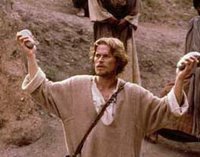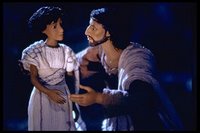
In previous years, I’ve offered a
review of the year, although this has rather fallen by the wayside in recent time. However, 2014 was a bit of a stonker, so it would seem remiss not to do at least
something.
The big news was, of course, the long awaited release of a number of biblical epics, which hit not just the odd art-house cinema, or graced a local congregation with a decentish video projector, but in the local, everyday cinemas. Russell Crowe was talking about Noah in primetime TV shows. The Guardian was offering opinion pieces about Moses every time Ridley Scott coughed in a vaguely atheistic manner.
As it turned out neither film made the, um, waves, that their respective studios had hoped for and neither director will be pleased to hear that they are more likely to win a Razzie than an Oscar come the spring.
But before all that there was the matter of the
Son of God - not so much the actual one as the cinema release of the Gospel footage from the History Channel’s 2013 series
The Bible. Cutting down a TV series to a movie is a risky strategy. On the one hand the popularity of the “best of” genre might mean that he TV series might just be part of a lengthy marketing campaign – the world’s longest ever trailer if you like. But the question still remained, why would people get in their cars, drive out of town and pay through the nose to watch something they have already seen for “free”?
As it turned out
Son of God did rather well, perhaps because compelling answers were found to that question. Buying a ticket to
Son of God was a statement of faith, a chance to send a message to Hollywood. Or you could buy two and bring along a friend with whom you wanted to share your faith.
From an artistic point of view however the quality of the product was largely the same as that of the original 2013 series. Jesus was still too blond and off-puttingly good looking; the dialogue and the acting still left a great deal to be desired; and it still wasn’t really clear what Jesus was actually about other than being nice.
One Bible film hero who eluded, with consummate ease, any charge of being overly nice, was Russell Crowe’s Noah, who shifted from grunting environmentalist to genocidal maniac over the course of Darren Aronofsky’s
Noah. It’s the kind of precipice along which many edge along when they tell us how bad humans in general, and children in particular, are bad for the environment? But that’s another matter.
Actually the scenes where Noah contemplates whether he should kill his own granddaughter were, in my opinion, rather misunderstood. Noah didn’t want to murder members of his own family, he just thought it might be what “The Creator” was calling him to do. After all it was the logical extension of what he had already done – a point that may of the faithful struggle to appreciate. It was a great performance from Crowe, but the terrain of unlikeable anti-hero seemed to leave the film, rather than just its antihero rather unloved. It was a shame. Aronofsky’s bizarre epic was drenched in biblical and other religious references, many of which weren’t even half as odd as the original text.
December is often a busy time of year for those of us interested in Bible films and 2014 would prove no exception. In the cinema Ridley Scott's
Exodus: Gods and Kings (
my review ) received a fairly lukewarm welcome in many western countries and was banned in several countries in North Africa and the Middle East. In the current climate it's hard to know which is more damaging, western indifference or Egyptian anger.
In the west the film's biggest talking point was the supposed white washing, casting Joel Edgerton and Christian Bale as an Egyptian and someone who manages to pass as an Egyptian for forty years. I must admit I can see both sides of the argument. On the one hand Christian art has always portrayed the faith's heroes in its own image as a way of relating to them. At the same time, as my comments above about
Son of God suggest I also like to see more realistic casting.
One film that did embrace a more ethnically accurate Jesus was
The Gospel of John the latest output from the
Lumo Project (an offshoot of
Big Book Media). The series, which is available on Netflix, narrates John's Gospel over dramatized reconstructed video footage. Jesus is played by Selva Rasalingam who is half Tamil. If his face is familiar it’s because he has been playing Jesus in various Lumo/Big Book projects over the last few years, including the music video for Deliriou5?'s "History Maker" and the BBC’s
The Story of Jesus (2011). Also part of those projects, as well as 2012’s
David Suchet: In the Footsteps of St Paul, is director David Batty.
The Lumo Project will eventually cover all four gospels in the same style, and Netflix features narration in both the King James and the New International versions of the Bible. As a medium it’s very similar to the Genesis Project’s
Gospel of Luke (1979) which starred Brian Deacon and was recut as
Jesus (1979), certainly it’s quite different in feel from other the two Visual Bible word for word projects
Matthew (1994) and
Gospel of John (2003).
Given that John’s Gospel only received the word for word treatment 11 years ago, it’s surprising that the filmmakers have chosen to start with John, particularly as John’s wordy gospel is perhaps the one least suited to such a treatment. Personally I wished they’d opted for the only gospel not, yet, to have been filmed this way, Mark. But that will later this year if the IMDb is to be believed. Hopefully it will get a UK Netflix release as well. Incidentally 2015 will also see Rasalingam star as James in a Jesus-cameo film
Clavius

The appearance of
The Gospel of John on Netflix seems to reflect a broader trend of niche faith-based films being broadcast away from traditional channels. Another such production in 2014 was
The Red Tent, an adaptation of Anita Diamant’s historicalish novel of the same name. Diamant’s novel took the stories from around Genesis around Leah and Jacob’s daughter Dinah and re-imagines Shechem as her lover rather than her rapist. Young’s mini-series, which aired on the Lifetime network early in December, cast Rebecca Ferguson, star of 2013’s excellent
The White Queen’s, and also features Minnie Driver, Debra Winger, Morena Baccarin and Hiam Abbass in prominent roles. Peter Chattaway has a
great interview about the series with the director Roger Young.
The other TV film worth a mention was the BBC animated short film
On Angel Wings, which aired in the UK on Christmas Eve. It starred an old man recalling the visit of the Angels on the first Christmas night to the group of shepherds he worked for and how one angel secretly flew him to the stable so he got to meet the baby Jesus. Readers may recall my enjoyment of the
Fourth King a fictional tale about the magi.
On Angel Wings would make a good companion piece dealing as it does with Jesus' other Christmas visitors.
Then there were several smaller films which brought the more poetic parts of the Bible to the screen.
The Song re-imagined the life of
King Solomon as an amorous country singer, with nods to both Song of Songs/Solomon and Ecclesiastes. Meanwhile Amos Gitai directed one of the short films in the anthology film
Words with Gods. Gitai already has two fine Bible films under his wings, [
Esther (1996) and
Golem: l'esprit de l'exil (1992)] and here he took the on the work of his namesake, the prophet Amos.
Perhaps the most significant of the films dealing with the more poetic parts of the Bible was Andrey Zvyagintsev's
Leviathan. As with
The Song it took the form of a modern story, this time the story revolves around a man fighting corruption in the coastal town where he lives, but there is also a healthy dose of the Book of Job. It's also likely to be the most successful of those films with a substantial link to the Bible, having been Russia's entry for the foreign language Oscar it's now one of the final nominations and has already won the Golden Globe in the same category.*
Documentary-wise it was a fairly light year, though it's more than possible I missed something. David Suchet did feature in
In the Footsteps of St. Peter, the follow up to his 2013
In the Footsteps of St Paul .
However, there were a couple of new books about Bible Films that are worth a mention. David Shepherd's "The Bible on Silent Film" looks to be an excellent guide to an under-discussed period in the genre's development. I couldn't afford the hardback or a Kindle editions so I've only read excerpts but the bits I've read are full of fascinating detail and insight. Technically the hard back was released right at the end of 2013, but seeing as the paper back will be released in March this year, we can split the difference. I'm looking forward to getting a copy.
Another book to touch upon the sub-genre is Graham Holderness' "Re-Writing Jesus: Christ in 20th-Century Fiction and Film" which touched on
Last Temptation of Christ,
The Passion of the Christ and
The DaVinci Code, as well as various books about the life of Jesus. There were also various books released related to the films mentioned above including a picture book for the team behind
Son of God.
And lastly there was a conference. Not so much about a Jesus Films as a very close relation. "Jesus and Brian: or What Have the Pythons Ever Done for us?" ran for three days in June in Kings College, London and featured an impressive team of speakers, including John Cleese and Terry Jones, and even gained some national press coverage. Sadly neither time, nor money, nor health, permitted me to be there, but Mark Goodacre made it,
blogged about it and did rather rub salt in the wounds of those of us who would have loved to be there but weren't. I mean, he got to meet John Cleese.
Anyway 2015 promises a great deal. There are various films due for release about which Peter Chattaway is doing some
great blogging. He also posts numerous things on the
Bible Films Facebook page, for which I'm incredibly grateful. There's also a few books to look out for, including David Shepherd's follow up volume "The Silents of Jesus" and there might even be a book with a couple of chapters by myself to report on in next year's review of the year.
*There were some subsequent edits here, made after the Oscar nominationsLabels: Exodus: Gods and Kings, Genesis, Gospel of John, Job, Life of Brian, Lumo Project, Noah (2014), Red Tent, Reviews of the Years
 Mark Goodacre is currently teaching a module on Jesus in Film which is good news for the rest of us as it has led to him uploading his Celluloid Jesus pages again, as well as adding a substantial amount of new material and a few extra blog posts to boot.
Mark Goodacre is currently teaching a module on Jesus in Film which is good news for the rest of us as it has led to him uploading his Celluloid Jesus pages again, as well as adding a substantial amount of new material and a few extra blog posts to boot.














































